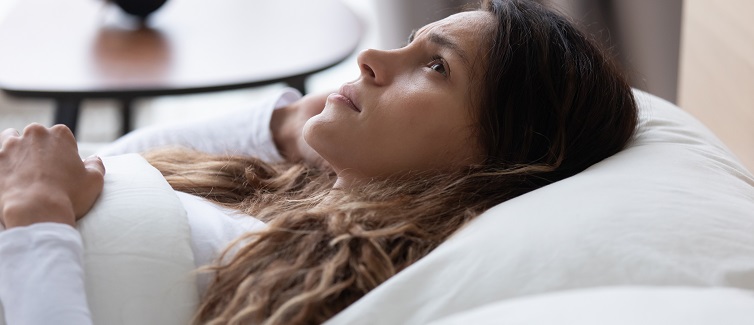Sweating is how your body cools down when your core temperature gets too hot. It protects your body from overheating. It’s one thing to sweat while working out, but sweating at night while sleeping is uncomfortable and unsettling.
Read on to learn about some common causes of night sweats and how to stop night sweats from happening.
Never Miss a Beat!
Subscribe to Our HealthBeat Newsletter!
Thank you for subscribing!
You can now select the specific newsletters you'd like to receive.
You are already subscribed.
Subscribe to more newsletters in our email preference center.
Sorry, an error occurred. Please try again later.
Get Healthy Tips Sent to Your Phone!
Common Causes of Night Sweats
It’s normal to sweat a little bit at night. Most often, it happens because you’re overdressed or your bedroom is too warm.
True night sweats are more intense episodes of sweating. They can wake you from a sound sleep and leave you and your sheets soaking wet. What’s more, when they happen often, that disrupted sleep makes it hard to function the next day.
Most of the time, night sweats aren’t a serious cause for concern. They often go away on their own or after you make some lifestyle changes.
These are some common causes of night sweats:
Menopause
If you’re female and in your 40s to early 50s, menopause might be the cause of your night sweats. Also known as hot flashes (or flushes), they’re one of the most common symptoms of menopause. Hot flashes due to menopause last an average of 10 years, and for many women, they’re especially bothersome at night.
Night sweats are often more intense in women who experience premature menopause after having their uterus and/or ovaries removed.
Hormone disorders
Besides changes in estrogen levels that come with menopause, other hormone disorders might cause more sweating at night while sleeping. Common causes are high thyroid hormone (hyperthyroidism) or pituitary hormone (hyperpituitarism) levels. Hypoglycemia (low blood sugar) can happen if your body produces too much insulin — one symptom is sweating.
Stress and anxiety
When you feel stressed, nervous, and anxious during the day, you might notice you sweat more. The same can happen at night. Anxiety can cause panic attacks, bad dreams, and sweating at night while sleeping.
Certain medicines
If you take these medicines, you might experience more night sweats:
- Antidepressants that increase serotonin levels (SSRIs).
- Diabetes medicines that lower blood sugar, like insulin.
- Hormone-blocking drugs like tamoxifen.
Infections
Some common illnesses, including the flu, can cause fevers and night sweats. Other infections that cause night sweats include:
- Tuberculosis – a lung infection.
- Endocarditis – an infection in your heart’s inner lining and valves.
- Osteomyelitis – a bone infection.
Lifestyle triggers
If you have occasional night sweats, something you’re doing in the evening or before bedtime might cause them. You might be sensitive to spicy food or caffeine in that piece of chocolate cake or espresso after dinner. Drinking alcohol or smoking cigarettes can also trigger night sweats.
Exercising too close to bedtime, taking a hot shower before bed, or wearing heavy pajamas might also raise your body temperature.
How to Stop Night Sweats
If you have occasional night sweats, consider whether certain lifestyle triggers might cause them. Often a few changes can prevent you from losing sleep from night sweats.
- Switch to a lighter blanket and pajamas to keep yourself from overheating. Open your window or turn up the AC to keep your bedroom cool.
- Make sure you're not working out or doing anything to raise your body temperature right before bed. And try to limit alcohol and caffeine in the evening.
If you take hormone replacement therapy for menopause or any other medicines, confirm you’re taking the recommended dose. You should also check with your doctor if you suspect a new medicine is causing your night sweats. They may need to adjust the dose.
When to See a Doctor
If your night sweats are severe or affecting your quality of sleep, it’s best to see your doctor. If an underlying health condition is causing them, your doctor might change or add a medicine to help manage them. They can also check to make sure a new health problem isn’t causing your night sweats.
You should also alert your doctor if you notice symptoms like unexplained weight loss, fatigue, or fever along with your night sweats. These could be warning signs that you may have a serious infection or some types of cancer.
Sources
About UPMC
Headquartered in Pittsburgh, UPMC is a world-renowned health care provider and insurer. We operate 40 hospitals and 800 doctors’ offices and outpatient centers, with locations throughout Pennsylvania, Maryland, New York, West Virginia, and internationally. We employ 4,900 physicians, and we are leaders in clinical care, groundbreaking research, and treatment breakthroughs. U.S. News & World Report consistently ranks UPMC Presbyterian Shadyside as one of the nation’s best hospitals in many specialties and ranks UPMC Children’s Hospital of Pittsburgh on its Honor Roll of America’s Best Children’s Hospitals. We are dedicated to providing Life Changing Medicine to our communities.
